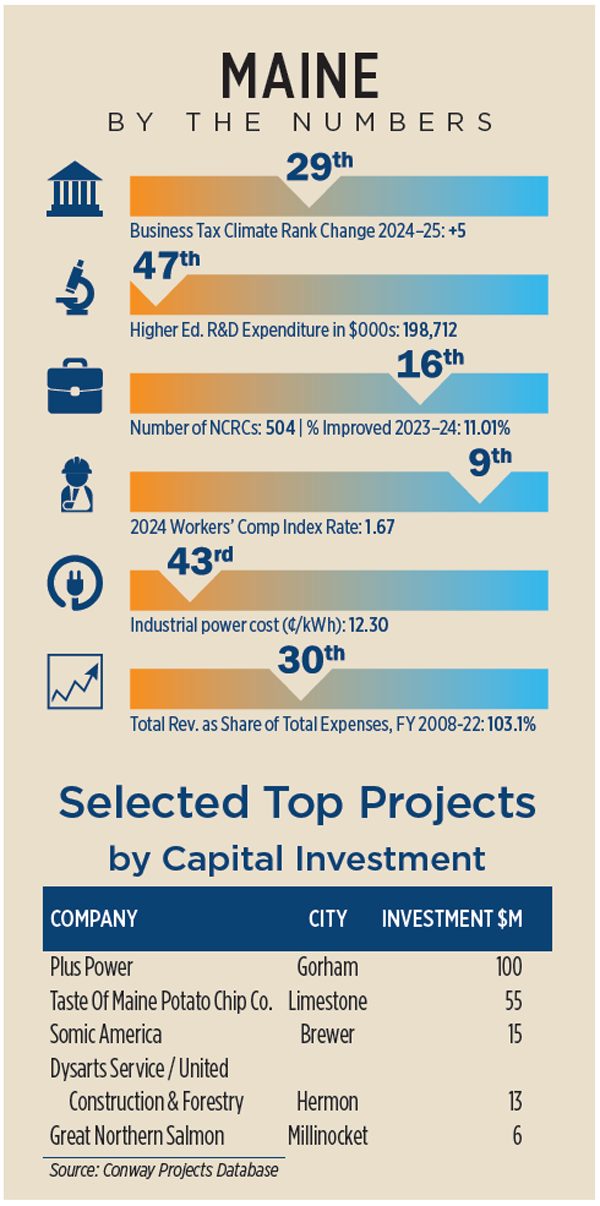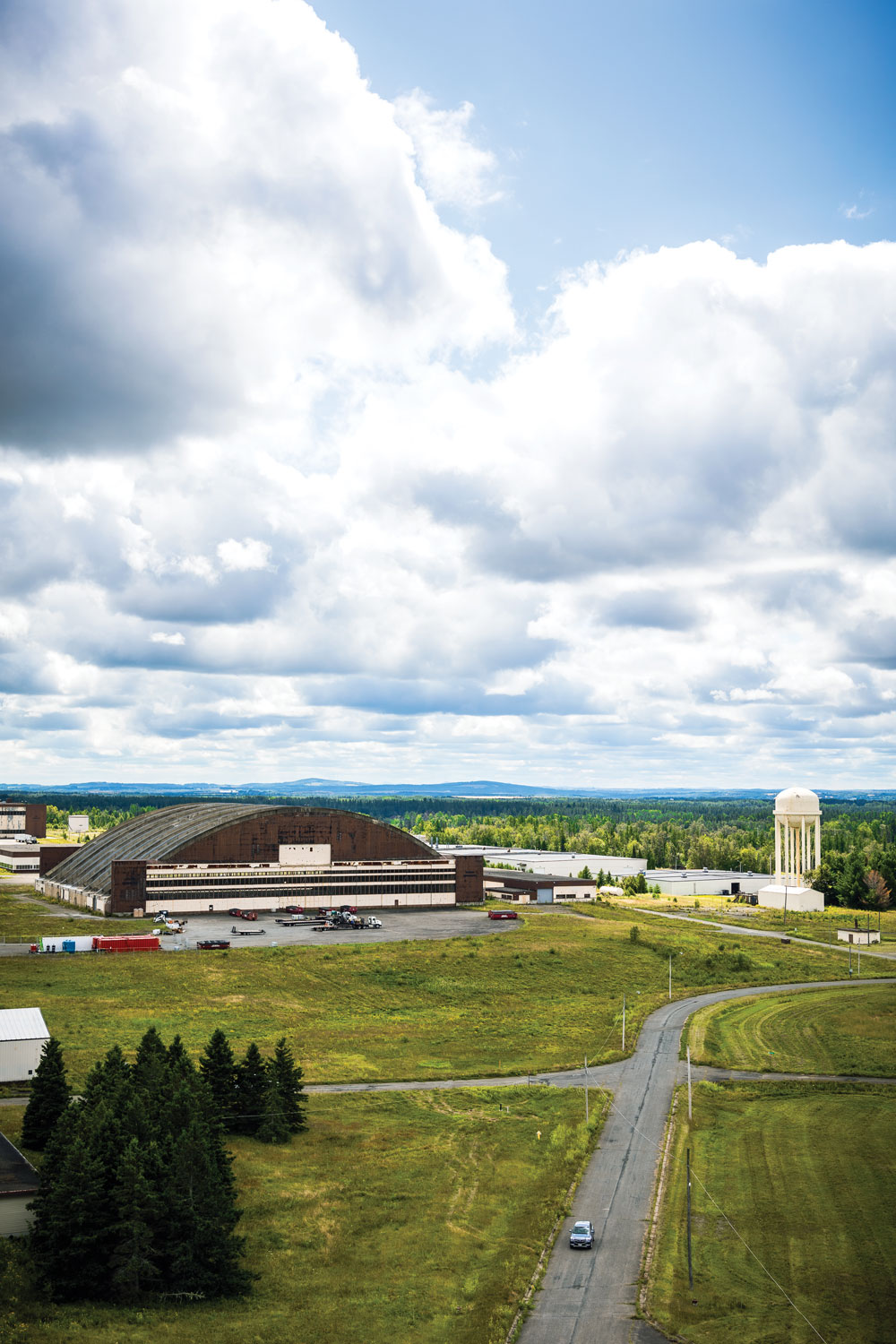This corner of New England is poised for revitalization.
by Kelly Barraza
The way to a Mainer’s heart is through their stomach — appropriate for this New England state abundant in food and agricultural resources.
In March, the Taste of Maine Potato Chip Company broke ground on a new $55 million, 88,000-sq.-ft. potato chip manufacturing facility at Loring Commerce Centre in Limestone, Aroostook County, the largest and most northern county of Maine known for its rural beauty, forested areas and potatoes. The potato chip plant is the first new construction at the former Loring Air Force Base, which shuttered its hangars for military use in 1994. The plant is set to receive a 30-year tax incentive approved by the town of Limestone last year. The project will create 40 to 60 jobs paying over $50,000 a year.
Slated to open in spring of 2026, the plant will source locally grown russet potatoes for the production of their chips, which will be well supplied by the $1.3 billion Maine potato industry that in 2022 supported over 6,000 jobs and $237 million in labor income, according to the USDA National Agricultural Statistics Service.
Plans for the plant were first announced in early 2024 by local businessman Bruce Sargent and Jim Pelkey of Falcon Transportation in Presque Isle, Maine. Sargent spoke to Site Selection about the project and this area of Maine, indicating how bullish the city of Limestone and the Loring Development Authority have been in revitalizing business at the 3,800-acre base. The growing business roster there now includes established and prospective projects such as a sustainable aviation fuel facility from DG Fuels, an AI startup and investment group Green 4 Maine.

Big Plans for Limestone
Sargent’s early exposure to the local Maine potato and agriculture business before his 40-year-long career in refrigerated freight transportation clearly left roots that will help boost the ambitious project through its development phase.
“I’m up for the challenge,” he says. “There’s always room for the little manufacturer. I don’t worry about the competition.”
Initially operating independently, Sargent plans to scale the plant’s production with eyes on a potential partnership with larger food and beverage entities in order to deliver his product across the United States.
“I want to put out a good product, and I want to put it out fast at a high volume,” Sargent says of Taste of Maine Potato Chips’ future distribution plans. “Private label and co-pack is my object — selling to franchises like Publix, Food Lion.”
The Loring Development Authority and City of Limestone were noted for their collaboration with industry to build out Loring Commerce Centre, with Limestone open to offering 20- and 30-year tax increment financing (TIF) and other duty-free options to new businesses looking to grow in the area.
The facility’s location in Maine, where the potato is one of many crops farmed on a large scale, is strategic in avoiding the need to import potato crop from other states like Idaho and Washington. This is vital for reducing freight cost and managing shrinkage rate in the food manufacturing process. It also allows Taste of Maine to work directly with local Maine farmers.
The Taste of Maine factory will fry potato slices in batches with each industrial fryer having a capacity of 500 pounds of finished product per hour. A total of eight fryers are planned at full build-out.

Repurposing an Air Force Base
The potato chip plant is just one of many in-progress and recently completed projects at Loring Commerce Centre.
In November 2024, sustainable aviation fuel (SAF) company DG Fuels announced a $4 billion, 1,200-acre SAF facility at Loring Commerce Centre expected to break ground in 2026. This location is planned to have a yearly output of 190 million gallons of jet fuel derived from 1.7 million tons of wood biomass. There is discussion on whether inactive rail in northern Maine will be repurposed for this operation, as DG Fuels has worked with the Maine Department of Transportation to identify existing rail that may be used to transport biomass from Limestone to Loring across Aroostook County. DG Fuels has also indicated interest in using an existing pipeline to carry SAF from Loring to coastal Maine for distribution at airports on the Eastern Seaboard.
“This project, when completed, would represent a big part of the vision that the state has always had for Loring,” stated then-Loring Development Authority of Maine Board Chair Jeremy Fischer in 2022, noting that the potential impact cannot be overstated in terms of jobs and increased economic activity in the area. “Thanks to all who have brought their efforts to bear to make this a reality and thanks in advance to those whose contributions have yet to be made.”
Green 4 Maine, based in Portland, Maine, is also working with DG Fuels to build workforce housing in Loring to support the project construction. DG Fuels is also planning several sustainable fuel facility projects across the U.S., including in Nebraska and Minnesota (see the January 2025 issue of Site Selection).
Maine-based artificial intelligence company Eternal Mind also opened its office at the Loring Commerce Centre in 2024. Eternal Mind works with companies to automate processes, using everything from predictive analytics to natural language processing in their business model.

